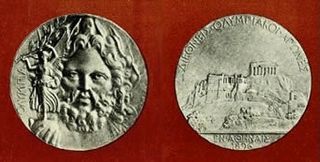Related Research Articles

The International Olympic Committee is the international, non-governmental, sports governing body of the modern Olympic Games. Founded in 1894 by Pierre de Coubertin and Demetrios Vikelas, it is based in Lausanne, Switzerland. The IOC is the authority responsible for organizing the Summer, Winter, and Youth Olympics. The IOC also is the governing body of the National Olympic Committees (NOCs) and of the worldwide Olympic Movement, the IOC's term for all entities and individuals involved in the Olympic Games. As of 2020, 206 NOCs officially were recognized by the IOC. The IOC president has been Thomas Bach since 2013.

The modern Olympic Games are the world's leading international sporting events. They feature summer and winter sports competitions in which thousands of athletes from around the world participate in a variety of competitions. The Olympic Games are considered the world's foremost sports competition, with more than 200 teams, representing sovereign states and territories, participating. By default, the Games generally substitute for any world championships during the year in which they take place. The Olympics are staged every four years. Since 1994, they have alternated between the Summer and Winter Olympics every two years during the four-year Olympiad.

The Summer Olympic Games, also known as the Summer Olympics or the Games of the Olympiad, is a major international multi-sport event normally held once every four years. The inaugural Games took place in 1896 in Athens, Greece, and the most recent was held in 2024 in Paris, France. This was the first international multi-sport event of its kind, organized by the International Olympic Committee (IOC) founded by Pierre de Coubertin. The tradition of awarding medals began in 1904; in each Olympic event, gold medals are awarded for first place, silver medals for second place, and bronze medals for third place. The Winter Olympic Games were created out of the success of the Summer Olympic Games, which are regarded as the largest and most prestigious multi-sport international event in the world.

The 1896 Summer Olympics, officially known as the Games of the I Olympiad and commonly known as Athens 1896, were the first international Olympic Games held in modern history. Organised by the International Olympic Committee (IOC), which had been created by French aristocrat Pierre de Coubertin, the event was held in Athens, Greece, from 6 to 15 April 1896.

The 1924 Winter Olympics, officially known as the I Olympic Winter Games and commonly known as Chamosix 1924, were a winter multi-sport event which was held in 1924 in Chamonix, France. Originally held in association with the 1924 Summer Olympics, the sports competitions were held at the foot of Mont Blanc in Chamonix, and Haute-Savoie, France between 25 January and 5 February 1924. The Games were organized by the French Olympic Committee, and were originally reckoned as the "International Winter Sports Week". With the success of the event, it was retroactively designated by the International Olympic Committee (IOC) as "the first Olympic Winter Games".

The Paralympic Games or Paralympics, also known as the Games of the Paralympiad, is a periodic series of international multisport events involving athletes with a range of disabilities. There are Winter and Summer Paralympic Games, which since the 1988 Summer Olympics in Seoul, South Korea, have been held shortly after the corresponding Olympic Games. All Paralympic Games are governed by the International Paralympic Committee (IPC).

The 1900 Summer Olympics, today officially known as the Games of the II Olympiad and also known as Paris 1900, were an international multi-sport event that took place in Paris, France, from 14 May to 28 October 1900. No opening or closing ceremonies were held.

The Pan American Games, known as the Pan Am Games, is a continental multi-sport event in the Americas. It features thousands of athletes participate in a competitions to win different summer sports. It is held among athletes from nations of the Americas, every 4 years, the year before Summer Olympics. It is the second oldest continental games in the world. The only Winter Pan American Games were held in 1990. In 2021, the Junior Pan American Games was held for the first time specifically for young athletes. The Pan American Sports Organization is the governing body of the Pan American Games movement, whose structure and actions are defined by the Olympic Charter.

An Olympic medal is awarded to successful competitors at one of the Olympic Games. There are three classes of medal to be won: gold, silver, and bronze, awarded to first, second, and third place, respectively. The granting of awards is laid out in detail in the Olympic protocols.

Olympic sports are sports that are contested in the Summer Olympic Games and Winter Olympic Games. The 2024 Summer Olympics included 32 sports; the 2022 Winter Olympics included seven sports. Each Olympic sport is represented at the International Olympic Committee (IOC) by an international governing body called an International Federation (IF).

The 1904 Summer Olympics were held in St. Louis, Missouri, United States from July 1 to November 23, 1904, as part of the St. Louis World's Fair.
The 1900 Summer Olympics were held in Paris, France, from May 14 to October 28, 1900, as part of the 1900 World's Fair.

The 1896 Summer Olympics, officially known as the Games of the I Olympiad, were a summer multi-sport event held in Athens, the capital of Greece, from 6 to 15 April 1896, and were the first Olympic Games of the Modern era.

Athletes from Germany (GER) have appeared in 27 of the 30 Summer Olympic Games, having competed in all Games except those of 1920, 1924 and 1948, when they were not permitted to do so. Germany has hosted the Summer Olympic Games twice; the 1936 Games in Berlin, and the 1972 Games in Munich.

Canada has competed at 28 Summer Olympic Games, missing only the inaugural 1896 Summer Olympics and the boycotted 1980 Summer Olympics. This count includes the 1906 Olympic Games, deemed unofficial 43 years after they were held. The nation made its debut at the 1900 Summer Olympics. Canada competes under the IOC country code CAN.

The all-time medal table for all Olympic Games from 1896 to 2024, including Summer Olympic Games, Winter Olympic Games, and a combined total of both, is tabulated below. These Olympic medal counts do not include the 1906 Intercalated Games which are no longer recognized by the International Olympic Committee (IOC) as official Games. The IOC itself does not publish all-time tables, and publishes unofficial tables only per single Games. This table was thus compiled by adding up single entries from the IOC database.

Boxing has been contested at every Summer Olympic Games since its introduction to the program at the 1904 Summer Olympics, except for the 1912 Summer Olympics in Stockholm, because Swedish law banned the sport at the time. The 2008 Summer Olympics were the final games with boxing as a male only event. Since the 2012 Summer Olympics, women's boxing is part of the program.
The Olympic medal table is a method of sorting the medal placements of countries in the modern-day Olympics and Paralympics. The International Olympic Committee (IOC) does not officially recognize a ranking of participating countries at the Olympic Games. Nevertheless, the IOC does publish medal tallies for information purposes, showing the total number of Olympic medals earned by athletes representing each country's respective National Olympic Committee. The convention used by the IOC is to sort by the number of gold medals the athletes from a country have earned. In the event of a tie in the number of gold medals, the number of silver medals is taken into consideration, and then the number of bronze medals. If two countries have an equal number of gold, silver, and bronze medals, they are ordered in the table alphabetically by their IOC country code.

The Olympic Games ceremonies of the ancient Olympic Games were an integral part of the games; modern Olympic Games have opening, closing, and medal ceremonies. Some of the elements of the modern ceremonies date back to the ancient games from which the modern Olympics draw their ancestry. An example of this is the prominence of Greece in both the opening and closing ceremonies. During the 2004 Summer Olympics, the medal winners received a crown of olive branches, which was a direct reference to the ancient games, in which the victor's prize was an olive wreath. The various elements of ceremonies are mandated by the Olympic Charter, and cannot be changed by the host nation. Host nations are required to seek the approval of the International Olympic Committee (IOC) for ceremony elements, including the artistic portions of the opening and closing ceremonies.
References
- Borden, Sam (16 February 2014). "The Games' Unfamiliar Honor (Even Among Its Recipients)". The New York Times . Retrieved 21 February 2014.
- "Olympic Charter" (PDF). International Olympic Committee. Archived (PDF) from the original on 14 May 2021. Retrieved 26 July 2021.
- "What do winners at the Olympic Games receive?". International Olympic Committee. Archived from the original on 4 March 2016. Retrieved 21 February 2014.




